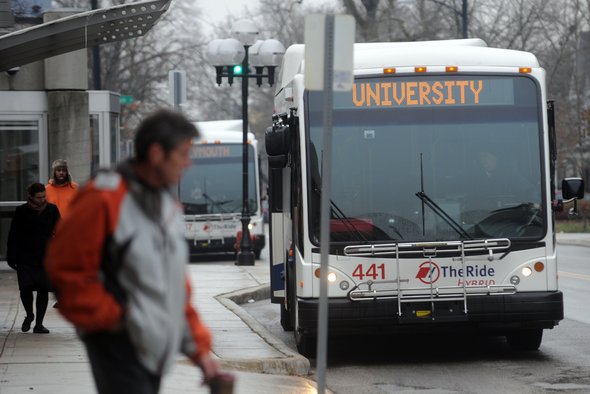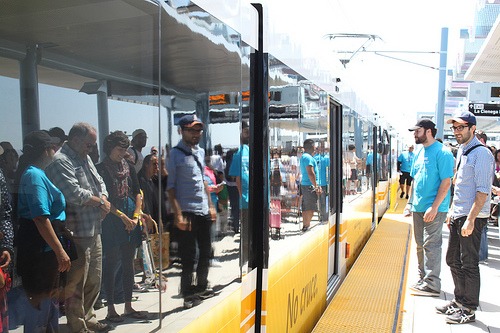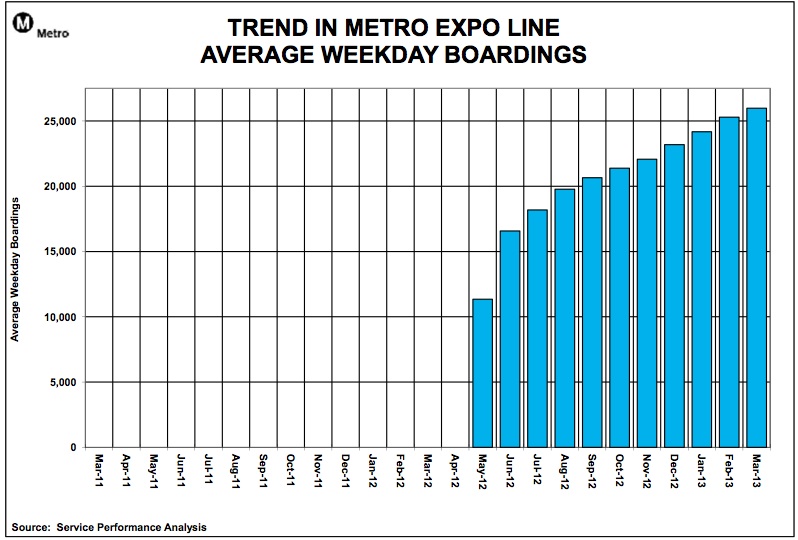marmar
marmar's JournalMore than 35% of U.S. Public Transit Buses Use Alternative Fuels or Hybrid Technology

from the American Public Transportation Association:
More than 35% of U.S. Public Transit Buses Use Alternative Fuels or Hybrid Technology
Public Transportation is Leading the Way in Green Vehicles
In celebration of Earth Day, the American Public Transportation Association (APTA) reminds us that taking public transit is among the most effective ways of reducing our daily carbon footprint because of its ability to take cars off the road. In fact, when APTA examined the bus fleet alone, more than 35 percent of U.S. public transportation buses use alternative fuels or hybrid technology, as of January 1, 2011. This is a striking contrast to the 1.3 percent of automobiles that used alternative-fuels in 2010, according to the Energy Information Administration’s (EIA) Annual Outlook.
“Public transportation is leading the way with environmentally efficient vehicles,” said APTA President and CEO Michael Melaniphy. “The public transit vehicle fleet is the proving ground for environmental technology that may some day become a part of the nation’s automobile fleet.”
APTA statistics for early 2011 show that 18.6 percent of U.S. transit buses used compressed natural gas (CNG), liquefied natural gas (LNG) and blends. Almost 9 percent (8.8%) of public transit buses were hybrids and nearly 8 percent (7.9%) of public transit buses used biodiesel.
“Today’s modern public transit bus is increasingly either a hybrid or is powered by fuels that are good for the environment,” said APTA Chair Flora Castillo. “The public transportation industry is a green industry and is committed to improving the environment.” ........................(more)
The complete piece is at: http://www.apta.com/mediacenter/pressreleases/2013/Pages/130422_Earth-Day.aspx
Ridership on LA's Expo Line is steadily increasing -- and it doesn't seem to be impacting bus use
One Year Later, Who Is Riding the Expo Line?
Axel Hellman | May 1, 2013 | 5:55 p.m. PDT
Staff Reporter

[font size="1"]Expo Line passengers /photo credit: stevebott (flickr)[/font]
When the Expo Line, Los Angeles Metro’s newest light rail line, opened in April 2012, initial ridership numbers were low, starting at around 11,000 per average weekday, a fact which many media sources reported on. One libertarian think tank even used these low numbers to argue that light rail systems in general should not be built.
But now, one year later, the picture is very different. Ridership on weekdays has been increasing at a steady clip of about 1,000 per month, reaching an estimated 26,000 per day during the week. Given that Metro projected about 27,000 riders per day by the year 2020, that number is very good. The number of people riding the Expo Line may pass that benchmark in the coming months.

[font size="1"]A graph of Expo Line ridership per month. (LA Metro)[/font]
A Metro spokesperson, Jesse Simon, disputed the line’s naysayers, cautioning that ridership will rise with time, “A favorite tactic of rail critics used to be to take statistics from a year or two after the opening date of a rail [line] to show that out-year estimates of rail patronage were grossly exaggerated. But changing to rail involves a longer process of changing habits. Our experience with rail patronage, and I believe experience elsewhere, is that rail growth is incremental.“
Simon said that in the long term, ridership has been slowly increasing on Metro’s other rail lines, “Rail patronage has increased steadily almost every year since the first line opened in 1990; and not only because more lines came online – within each Line the growth has been steady and it has not reached a stable endpoint.” ....................(more)
The complete piece is at: http://www.neontommy.com/news/2013/04/one-year-later-who-riding-expo-line
Chicago's commuter rail may fold the cost of Wi-Fi access into monthly rail fare packages

(Sun-Times) Metra staff agreed Thursday to investigate the cost of folding Internet air cards into monthly rail fare packages after board committee members were taken aback by the projected tab of offering Wi-Fi on moving trains.
A consultant estimated that launching Wi-Fi that tapped Verizon, Sprint, AT&T and T-mobile to provide maximum reception on all 11 Metra rail lines would cost $33.5 million a year and $71.7 million over five years.
Left out of the equation was how much revenue Metra could reap from advertising and marketing because all of the bidders wanted to leave that up to Metra rather than assume responsibility for it and reflect that revenue stream in their bid.
“I’m taken aback by this,” said Metra board member Mike McCoy during a meeting of the Metra Capital Oversight Committee he chairs. “My impression was this was a cost neutral proposition.” .................(more)
The complete piece is at: http://www.suntimes.com/news/19857010-761/metra-considers-combining-internet-air-cards-and-rail-fare-packages.html
David Sirota: Want to save the world? Eat less meat
from In These Times:
What’s Really Speeding Global Warming
Want to save the world? Eat less meat.
BY David Sirota
In case you missed the news, humanity spent the Earth Day week reaching another sad milestone in the history of catastrophic climate change: For the first time, measurements of carbon dioxide in the atmosphere surpassed 400 parts per million—aka way above what our current ecosystem can handle.
Actually, you probably did miss the news because most major media outlets didn't cover it in a serious way, if at all. Instead, they and their audiences evidently view such information as far less news-, buzz- and tweet-worthy than (among other things) the opening of George W. Bush's library and President Obama's jokes at the White House Correspondents Dinner.
Such an appetite for distraction, no doubt, comes from both those who deny the problem of climate change and those who acknowledge the crisis but nonetheless look away from what feels like an unsolvable mess.
That sense of hopelessness is understandable. After all, some of the most hyped ways to reduce carbon emissions—electric cars, mass-scale renewable energy power plants, etc.—require the kind of technological transformations that can seem impossibly unrealistic at a time when Congress can't even pass a budget. ...................(more)
The complete piece is at: http://inthesetimes.com/article/14947/the_real_obstacle_to_halting_climate_change/
Maryland State Employees No Longer Able To Include Domestic Partners In Health Insurance
from the Baltimore Sun, via HuffPost:
The O'Malley administration has notified state employees in same-sex relationships that they won't be able to include domestic partners in their health insurance anymore.
If they want coverage, they'll have to get married.
The policy change is the result of the new Maryland law allowing same-sex marriage, which took effect Jan. 1. The thinking is that offering health coverage to an unmarried same-sex partner doesn't make sense anymore, officials said, particularly since an unmarried heterosexual partner doesn't have the same right.
But the move by the administration -- which introduced domestic partner benefits in 2009 and championed marriage equality last year -- has drawn polite dissent from some of the administration's staunchest allies. ................(more)
The complete piece is at: http://www.huffingtonpost.com/2013/05/03/maryland-state-employees-domestic-partners-health-insurance_n_3206605.html?ncid=txtlnkushpmg00000037&ir=Politics
Violent May Day: Police fire flash bangs, pepper spray at protesters in Seattle
Violent clashes marked the final hours of May Day protests in Seattle, as police officers fired pepper spray and launched 'flash bang' grenades into crowds, leading to two local reporters being pepper-sprayed and 17 arrests
The Real Tragedy: Ecological ruin stems from what happens to--not what is caused by--the commons
from OnTheCommons.org:
The Real Tragedy
Ecological ruin stems from what happens to--not what is caused by--the commons
By Jonathan Rowe
This is the from the new book Our Common Wealth: The Hidden Economy That Makes Everything Else Work, a collection of writings from Jonathan Rowe (1946-2011). Rowe was a co-founder of On the Commons and a co-editor of On the Commons.org.
In the belief system called economics, it is an article of faith that commons are inherently tragic. Almost by definition, they are tragic because they are prone to overuse. What belongs to all belongs to none, and only private or state ownership can rescue a commons from the sad fate that will otherwise befall it.
The standard reference for this belief is an article that appeared in Science in 1968 called “The Tragedy of the Commons.” Though the author, Garrett Hardin, was a biologist, his article was strangely lacking in scientific inquiry. It was more like economics—an extrapolation from assumptions rather than an investigation of reality.
Hardin assumed that all commons are free-for-alls. He bid his readers to “picture” a hypothetical pasture peopled with hypothetical herders. These herders existed outside of any social structure and lacked even a capacity to talk with one another. They all behaved according to what the economics texts call “rationality”: they let their herds loose in the pasture in a single-minded effort to maximize their own gain, with no thought for the future or for anybody else. Under those assumptions, tragedy is a foregone conclusion.
What Hardin overlooked is that people do not necessarily behave as economists assume they do. As historian E. P. Thompson observed, Hardin failed to grasp “that commoners themselves were not without common sense.” Thompson was referring specifically to the common-field agriculture of his own England. Households had their own plots but shared land for hunting, foraging, and grazing. They pooled their implements and labor for joint maintenance and combined their herds to fertilize their respective plots. The destruction Hardin declared to be inevitable simply did not happen. To the contrary, the system worked well for hundreds of years. ....................(more)
The complete piece is at: http://onthecommons.org/magazine/real-tragedy
Noam Chomsky: Boston and Beyond
Boston and Beyond
Thursday, 02 May 2013 13:21
By Noam Chomsky, Truthout | Op-Ed
April is usually a cheerful month in New England, with the first signs of spring, and the harsh winter at last receding. Not this year.
There are few in Boston who were not touched in some way by the marathon bombings on April 15 and the tense week that followed. Several friends of mine were at the finish line when the bombs went off. Others live close to where Dzhokhar Tsarnaev, the second suspect, was captured. The young police officer Sean Collier was murdered right outside my office building.
It's rare for privileged Westerners to see, graphically, what many others experience daily - for example, in a remote village in Yemen, the same week as the marathon bombings.
On April 23, Yemeni activist and journalist Farea Al-Muslimi, who had studied at an American high school, testified before a US Senate committee that right after the marathon bombings, a drone strike in his home village in Yemen killed its target.
The strike terrorized the villagers, turning them into enemies of the United States - something that years of jihadi propaganda had failed to accomplish. ........................(more)
The complete piece is at: http://truth-out.org/opinion/item/16138-boston-and-beyond
Obama Administration Refreshes Its Push for a Major Infusion of Funds into the National Rail Program

from the Transport Politic blog:
The Administration Refreshes Its Push for a Major Infusion of Funds into the National Rail Program
It’s an annual spectacle. The President releases his budget. The budget proposes a huge expansion in spending on surface transportation, particularly in high-speed rail. Administration figures testify on Capitol Hill, hoping to raise the specter of infrastructure failure if nothing is done. The Congress responds lackadaisically, with Democrats arguing that something should be done and Republicans doing everything they can to prevent a cent more from being spent, and ultimately no one agrees to much of anything other than a repetition of the past year’s mediocre investments.
Will things be different this year?
The question is particularly relevant because the U.S. Government’s rail investment program — its authorization for allocating funds to the Federal Railroad Administration (FRA) will expire this year. Legislation supporting the FRA, as well as Amtrak, the national passenger rail corporation, and improvements to freight rail, is necessary to ensure continuity of funding. Previous bills have authorized funding over five-year increments. In effect, the bills set out how much Congress expects to expend over the next few years, and allows the House and Senate to avoid debating the issue for years at a time.
The Obama Administration has responded to situation by proposing a massive infusion of funds for passenger rail and the creation of a “National High-Performance Rail System.” ..................(more)
The complete piece is at: http://www.thetransportpolitic.com/2013/04/29/the-administration-refreshes-its-push-for-a-major-infusion-of-funds-into-the-national-rail-program/
Why Are People with Health Insurance Going Bankrupt?
from the Real News Network:
Dr. Margaret Flowers is a pediatrician from Baltimore who advocates for a national single payer health system, Medicare for all. She is an organizer of October2011.org/Occupy Washington, DC and co-director of ItsOurEconomy.us.
Kevin Zeese is co-director of It's Our Economy, an organization that advocates for democratizing the economy. He's also an attorney who is one of the original organizers of the National Occupation of Washington, DC.
.....(snip).....
JAY: So tell us now. You have been critical about this from the beginning. You were for single-payer during the health-care debate. But now it's passed. It's starting to be implemented. You have a better idea what it is. So how's it looking?
FLOWERS: Right. Well, it's looking pretty much like what we expected. Right now the United States is the only industrialized wealthy nation that has a market-based health care system, and the Affordable Care Act moved us further in the direction of a market-based health care system by requiring people who don't qualify for the public programs to purchase private health insurance. That will be going into effect. The exchanges where people will buy that insurance roll out in October of this year. By January 2014, people have to have insurance or face a penalty.
But what we're seeing in terms of the type of insurance that people are going to be offered and the trends of what people are actually purchasing right now is we're moving more in the direction of what we call underinsurance, where people may have an insurance plan, but there are significant financial barriers to getting actual care and significant financial risks if someone has a serious accident or illness.
.....(snip).....
FLOWERS: Right. And also, you know, the thing that I often point out is that the United States is already spending more than enough for a universal, comprehensive, high-quality health-care system. We spend two and a half times what the average OECD nation, you know, industrialized nation spends per person on health care. So we have the money to do this and we have the resources to do this, and it's really just up to us to demand that we have the kind of health-care system that we need. And you can't get the cost—that was my point was that you can't get the real cost savings unless you do this at a national level.
ZEESE: What I was laughing about was I was thinking about Congress (incompr.) all this craziness about deficit. Health care's 18 percent of our GDP and going up, and you're not going to solve the deficit for the long term without solving health care. .......................(more)
The complete piece is at: http://therealnews.com/t2/index.php?option=com_content&task=view&id=767&Itemid=74&jumival=9986
Profile Information
Gender: MaleHometown: Detroit, MI
Member since: Fri Oct 29, 2004, 12:18 AM
Number of posts: 77,090